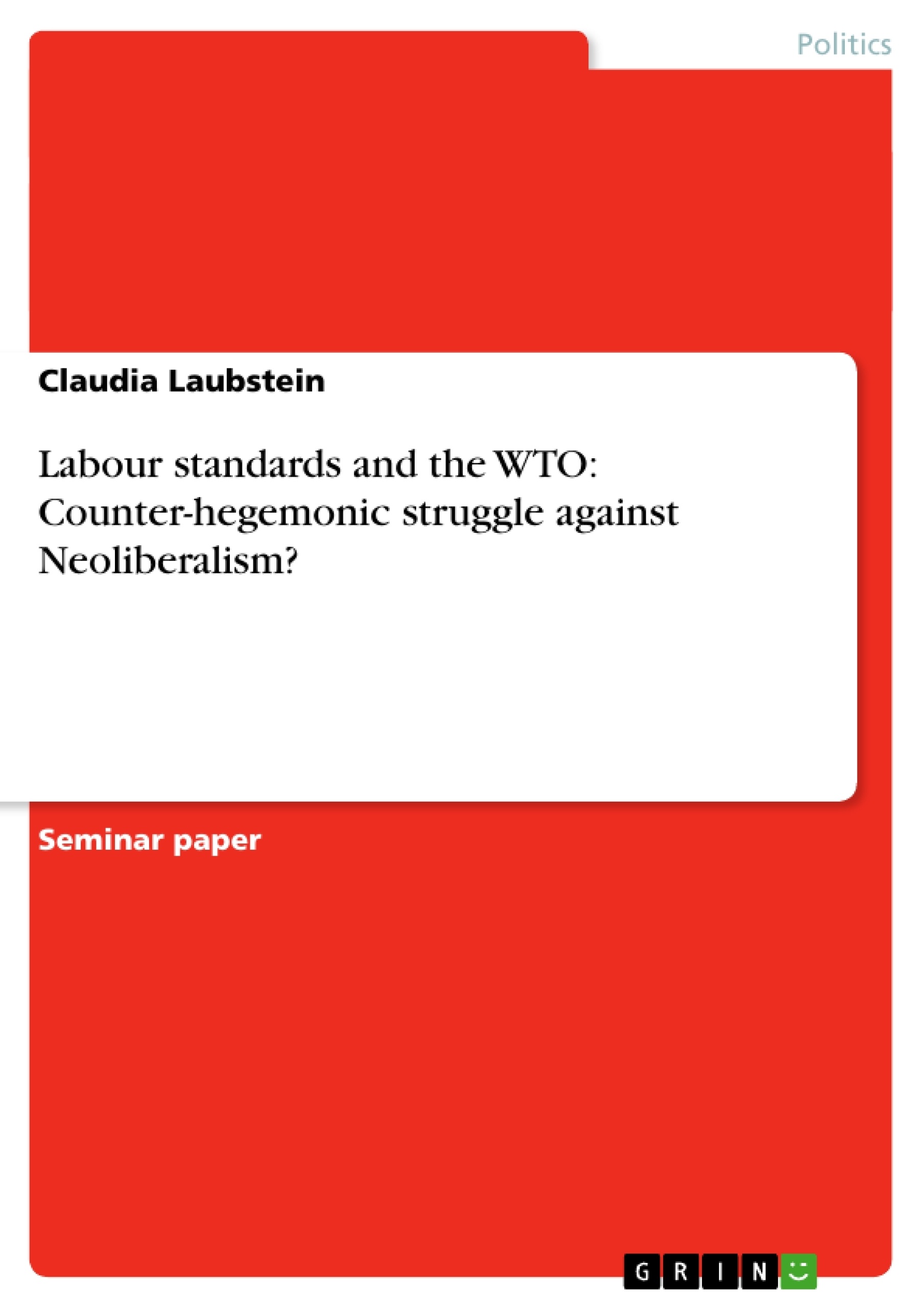This paper tries to determine causes for the only limited impact of labor movement. First, I will outline the neo-Gramscian approach to International Political Economy with its central concepts of hegemony and counter-hegemony. From a neo-Gramscian perspective, the labor movement is regarded as a counterhegemonic project which tries to change the hegemonic institution WTO to its advantage. I will show that the need for a social clause arose from tensions within the neoliberal order. In the analysis, the focus will be on the thesis that the labor movement itself is too divided and therefore does not represent a uniform strategy which would be necessary for the building of counter-hegemony. More particularly, a deep division runs between North and South. I will set up the thesis that the perception of an antagonism between Northern and Southern interests is further fueled by nationalist populist movements in developed countries, which themselves have their origins the neoliberal mode of production. The Singapore Ministerial Conference of the WTO in 1996 is the background for discussion because the introduction of labor issues rejected then and further attempts to revive the debate have not led to other results yet1. The dominance of neoliberalism and the social forces of capital will be overviewed in short because they benefit from the current absence of labor standards and therefore oppose the counter-hegemonic movement. The results will be summarized in the conclusion chapter.
Inhaltsverzeichnis (Table of Contents)
- 1. INTRODUCTION
- 2. THEORY: NEO-GRAMSCIAN PERSPECTIVES
- 3. BACKGROUND
- 3.1 World order
- 3.2 Singapore Ministerial Conference
- 3.3 The organizational structure of the labor movement
- 3.4 Reasons for labor's involvement with the WTO
- 4. ANALYSIS
- 4.1 Fragmentation of the labor movement
- 4.2 Division of working class: nationalist tendencies
- 4.3 Neoliberal and capital dominance in the WTO
- 5. CONCLUSION
Zielsetzung und Themenschwerpunkte (Objectives and Key Themes)
This paper examines the struggle of the labor movement against the neoliberal order of the global economy. It focuses on the attempt to link labor rights with trade in the World Trade Organization (WTO) and analyzes the reasons for the limited impact of the labor movement in this regard.
- The neo-Gramscian approach to International Political Economy and its central concepts of hegemony and counter-hegemony.
- The labor movement as a counter-hegemonic project seeking to change the hegemonic institution WTO.
- The fragmentation and division within the labor movement, particularly the deep division between North and South.
- The impact of nationalist populist movements in developed countries on the perception of antagonism between Northern and Southern interests.
- The dominance of neoliberalism and the social forces of capital, which oppose the counter-hegemonic movement.
Zusammenfassung der Kapitel (Chapter Summaries)
- Introduction: The paper introduces the debate about linking workers rights and trade, emphasizing its roots in the 19th century and the role of the International Labor Organization (ILO). It highlights the significance of the WTO as a potential legal framework for enforcing labor rights and presents the paper's critical perspective on the social forces involved in this struggle.
- Theory: Neo-Gramscian Perspectives: This chapter explains the neo-Gramscian approach to International Political Economy, contrasting it with mainstream problem-solving theories. It emphasizes the historical context and materialist focus of this approach, highlighting the importance of understanding social forces and their influence on international institutions.
- Background: This chapter provides context for the debate by discussing the world order, the significance of the Singapore Ministerial Conference of the WTO in 1996, the organizational structure of the labor movement, and the reasons for labor's involvement with the WTO.
- Analysis: This chapter analyzes the fragmentation and division within the labor movement, exploring the division between North and South and the role of nationalist populist movements. It also examines the dominance of neoliberalism and capital in the WTO.
Schlüsselwörter (Keywords)
The primary focus of this paper is on labor standards, trade, and the World Trade Organization (WTO). Key themes include counter-hegemony, neoliberalism, the labor movement, social forces, globalization, and the historical context of the debate. The neo-Gramscian approach to International Political Economy is used as a theoretical framework to analyze the struggle between different social forces and the influence of these forces on global institutions.
Frequently Asked Questions
What is the Neo-Gramscian approach to International Political Economy?
It is a critical theory that focuses on concepts of hegemony and counter-hegemony to understand how social forces and international institutions maintain or challenge the world order.
Why does the labor movement struggle to influence the WTO?
The movement is fragmented, particularly by a deep division between Northern and Southern interests, which prevents a unified counter-hegemonic strategy.
What happened at the 1996 Singapore Ministerial Conference?
The introduction of labor issues into the WTO framework was rejected, reinforcing the dominance of neoliberal trade principles over social clauses.
How do nationalist movements affect global labor solidarity?
Nationalist populist movements in developed countries fuel antagonism between workers in the North and South, undermining the building of international counter-hegemony.
Who benefits from the absence of global labor standards in the WTO?
Neoliberal forces and the social forces of capital benefit, as the lack of standards allows for lower production costs and unregulated global competition.
- Quote paper
- Claudia Laubstein (Author), 2004, Labour standards and the WTO: Counter-hegemonic struggle against Neoliberalism?, Munich, GRIN Verlag, https://www.grin.com/document/30793



